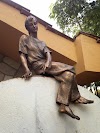It’s’ official’. You can get away with murder. Or rape. Indeed you can get out of jail, not for free but for the right bribe. The price: R15 000 to R20 000, depending on the police officer on duty.
So, at least, say many Sowetans I know. Living in Soweto I find that not hard to imagine. The reputations of the police and the traffic department were bad back in the days of Apartheid; they haven’t improved much over the last twenty years.
The opportunity for corruption in Soweto, as I suspect in many townships, is limited by the public resources available but not by the appetite for self-enrichment. That is even true in Orlando West where I live – right under the noses of the spot where Hector Pieterson was killed or where Nelson Mandela and Desmond Tutu once lived.
It’s in the area of crime and violence that corruption most affects us, the ordinary people of the townships and crime is a business. I have heard so many cases of people charged with rape and murder never appearing in court, let alone being sent to jail. Money, it seems, changes hands. Arrest dockets disappear. Vital evidence is lost. Some people who try to bring charges at a police station by themselves get laughed at. The murderers and rapists among us laugh loudest.
How has this double harm –crime and justice denied by corruption – affected us in Soweto? I talk to many people as I work as a retreat giver and trainer of spiritual directors. Two themes emerge: Nostalgia and Despair. Many express nostalgia for the past, even the Apartheid era. “At least in those days criminals and rapists were put in jail. Better still, they were hanged. We should bring back hanging,” observe quite a few of my friends.
There is also a sense of despair; despair at the way government has failed to deliver on its election promises. Apart from problems of poverty, the government has failed to clean up its own departments. In our case it has failed to make police and traffic police accountable and honest, actually doing their jobs. People are sick of rhetoric: some look to 2014 and consider changing how they voted. Most wonder whether voting is worth it.
The church communities in Soweto – and most other townships – are a source of support for victims doubly abused, first by criminals and then by the corruption of law enforcement. In places where psychiatric treatment and psychotherapy is thin on the ground, prayer groups and church associations provide the safe space for victims to mourn suffering and loss, to lament a world where it seems that it remains “survival of the fittest”.
But the Church needs to do more than help the wounded; it should take the struggle against corruption to the corrupt.
Corruption is not a ‘victimless crime’ that can be excused. The experiences shared with me by many Sowetans - whose quest for justice and safety has been sabotaged by corruption - tell me this is a lie.
For more Jesuit Institute perspective go to www.jesuitinstitute.org.za.




